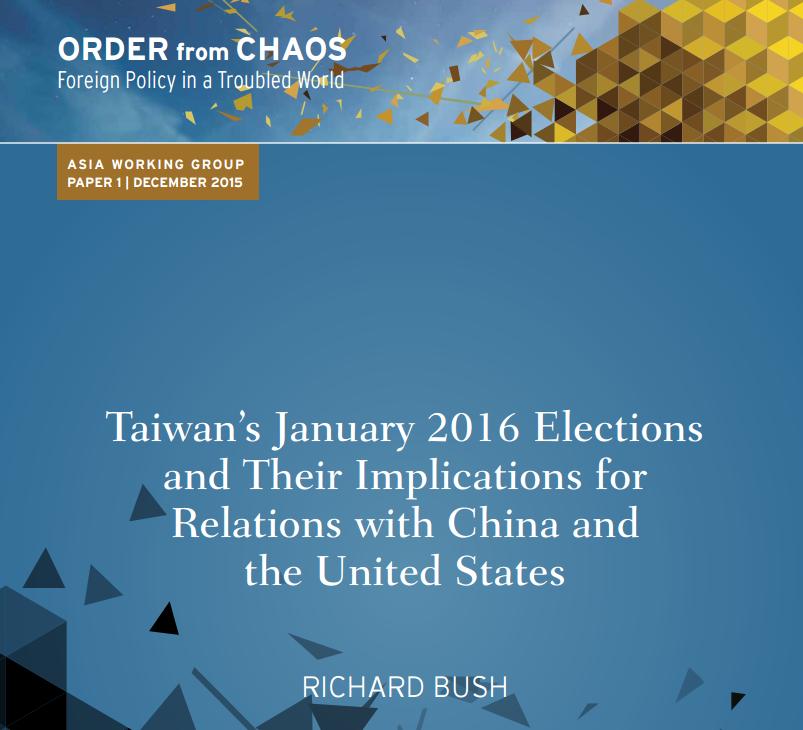美國政客又再替美國政府放話將以“雙重威懾”策略管制台灣?
美國政客(Richard Bush)表示,如果2016年台灣選舉後,台海出現兩岸懲罰與反應互動的狀況,美國將可能回到“雙重威懾”策略,以阻止台海緊張情勢升溫,但他承認這並不容易實施。隨者2016年台灣地區領導人的選舉,日子愈來愈近喇,國際間的政客專家們,也加速腳步,涉足台灣的選舉事件,企圖混水摸魚撈一票,尤其是美國人,你們台灣人,要注意理性的分析思考,任何外界的因素,都有可能影響選舉結果,你們台灣人的命運,為什麼老是被操縱於外國人?

布魯金斯學會東北亞政策研究中心最新發表布魯金斯學會的“混亂中的秩序--不安世界之外交政策”項目亞洲工作小組的第一號專文,標題是“台灣2016年1月選舉及其與中國和美國關係的意涵.
北京應對民進黨假設性的三種情境解讀 ?
根據情資分析,北京對民進黨可能勝選發出的警告,外界解讀有三種情境:
第一種是,北京採取戰術措施,以期影響台灣輿論,甚至施壓蔡XX來包容大陸。
如果民進黨上台,大陸可能對台灣施加代價,最有可能的凍結兩岸關係於目前的狀況,不談判新的協議,同時保留全盤的懲罰。
第二種是,北京採取沒有“九二共識”就沒有兩岸關係和平發展的“或取或舍”手法,做好充分準備對民進黨執政施加短期成本,包括一系列懲罰措施。這將是一種戰略而不只是戰術。
第三種是,大陸的警告只是“虛張聲勢”,並無意去實施。生活和兩岸關係將照舊,台灣不會因為民進黨勝選而招致代價。
中國國民黨朱XX獲勝最好,但美國政府方面應意識到現實,海峽兩岸將更近1步,協調溝通經濟,貿易等重大議題,中國國民黨與中國共產黨互相參訪其對方的中央黨部,進行黨務對話,加強於國,共兩黨思想溝通及協調,再啟動國共第六次合作,更務實的切入兩岸議題,深入討論,至執行細節,並追蹤成果,報備於雙方中央黨部之中央常會,列入記錄編輯檔案成冊.這是美國有關方面不願意接受的事實,代但又不能橫插一槓,阻礙海峽兩岸交流,更何況是國,共兩黨的家務事.所以對於下一屆的台灣政府或是美國政府,都存在者極大難度的挑戰,那麼到頭來又是中國撿到好處,穩穩當當的穩賺不賠?
2016年台灣選舉的政治局勢有很大不同。也就是說蔡XX強勢,國民黨較弱,所以美國的做法也調整適應。
眾所周知從邏輯上講,國民黨朱XX勝利的結果對美國來說是最好的,因為他的兩岸政策將與馬XX一致,這將減少台灣問題在正被其它問題所凌亂的美中關係中的突出性.這樣一來中美台3角習題,還可以有所折衝,選擇自己認為滿意的答案.
假設與此同時,華盛頓官員知道北京對蔡XX承諾的可靠性有非常不同的看法,而且北京可能不會以他們鼓勵的靈活和克制來應對如果發生第三種情境,美國將可能要回到“雙重威懾”(dual deterrence)策略。他強調,美國不能從兩岸競爭中完全撤出,因為美國的盟友和夥伴可能會將撤出解讀為美國的安全承諾不再可靠。
因為美國向來是機會主義創造者,同時又奉行民主式霸權主義,干預他國內政,外交,美國吃定台灣,這種具有錯綜複雜的中.美.台.3角關係.
就美國方面不願意再出現,在陳XX政府最後6年那樣令美台關係複雜化。美國敦促各方行使克制和靈活性,並警告反對任何一方單方面改變現狀的手法將繼續有意義。由此看來美國欲罷不能的將法碼,盡量的平均分配,好讓天枰保持適度的平衡,有那麼樣容易執行?
也許北京將引用美國不支持台灣獨立的聲明,台灣會斷言蔡的政策反映了通過民主選舉表達的人民意志,每方都有它自己有關是對方過錯的論述,並設法找到能影響華盛頓的杠杆點。
看起來華盛頓應該繼續提醒北京,它不支持台灣獨立。與此同時,美國必須警告台北,它應該自我克制,不要採取客觀上對中國與美國利益造成負擔的動議。這必竟牽涉到對台軍售案重大事件,美國不希望中國以此為藉口,對於美國武器軍火廠商及關係企業實施制裁報復,如此一來損失的還是美國,至於台灣只是花錢消災,買些破舊的2手武器回家把玩如此而已.
Taiwan’s January 2016 Elections and Their Implications for Relations with China and
the United States ......
Taiwan has been enmeshed in United States foreign policy for the last six and a half decades. It is a complex issue that is often a point of key contention in U.S.-China relations. What role Taiwan plays and the impact that follows has varied greatly over time, as has its impact on U.S.-China relations, for good or ill. The level of tensions has ebbed and flowed, along with the various factors at play, but the key factor has always been the degree of enmity between Beijing and Taipei. A high level of tension entails the risk of wider conflict that might draw in the United States and leads each side to enlist Washington support.
The main variable setting the level of tension and danger has repeatedly been presidential elections in Taiwan, because they produce new leaders, and often, new policies towards China. Since 2008, Taiwan’s President Ma Ying-jeou embarked on a policy that included reassurance to Beijing about the intentions of his government, engagement with China to normalize and expand cross-Strait economic relations, and the creation of stakes that each had in the preservation of peace and stability. Beijing responded well to these initiatives, but did not take all the steps that Ma has sought. The improvement in cross-Strait relations benefited the United States, since it freed up the time of national security decision-makers and led the Obama administration to take steps to improve its bilateral relations with Taipei.
Taiwan will have its next presidential election on January 16, 2016, as well as elections for a new legislature. It appears that Tsai Ing-wen, the leader of the opposition Democratic Progressive Party (DPP), will win an easy victory against Eric Chu, the candidate of the ruling Nationalist or Kuomintang (KMT), Ma Ying-jeou’s party. Tsai has been rather vague about her China policies, but Beijing has long believed that she and the DPP have the ultimate objective of creating Taiwan as a separate country with no political relationship with the Beijing regime (the KMT is vague about the ultimate relationship with China, but opposes Taiwan independence). To protect its interests, China has stated several principles that it insists any Taiwan leader must accept if he or she wants good cross-Strait relations. Ma signaled well before the 2008 election that he would accept those points, while adding his own definition. Eric Chu has said that he would accept them as well. Tsai has given no indication that she will accommodate to Beijing’s wishes.
Tsai’s likely election will thus present China with a choice. Will it ignore its own principles for the sake of continuity and good relations? Will it trigger deterioration in cross-Strait relations to impose costs on Taiwan for electing a leader that it doesn’t like? How much deterioration will it cause and how will Taiwan respond? Finally, how will the United States react to a cross-Strait dynamic that is more complicated than the one that it has enjoyed for the last eight years?
This essay does the following:
• Reviews the background of Taiwan’s democratization and how it affected the island’s relations with both China and the United States;
• Details the electoral situation in Taiwan prior to the upcoming presidential and legislative elections;
• Explores what the likely outcome of the presidential election may or may not mean for fundamental policies towards China;
• Outlines what Tsai Ing-wen, the current front-runner, has said about her cross-Strait policies;
• Details the significance of the November 7th meeting between Ma Ying-jeou and Xi Jinping;
• Explores Beijing’s options for responding to a Tsai victory;
• And, explains the key implications for U.S. policy towards Taiwan.
This paper is the first of a series from the Asia Working Group, part of the Foreign Policy program’s larger project, “Order from Chaos: Foreign Policy in a Troubled World.” The Order from Chaos (OFC) project is a year-long initiative that will assess the range of global issues confronting the United States and the international community - shifting dynamics between the world’s leading powers, the challenges posed by rising states like China and India, the threat posed by global extremism, to name a few. The OFC project will examine how these new dynamics and threats will impact efforts to achieve global stability and prosperity. Over the next year, the project will draw on expertise across the Brookings Foreign Policy program to both shape the public debate on pressing international issues of our time and ultimately to build a strategic agenda for the next U.S. president.
